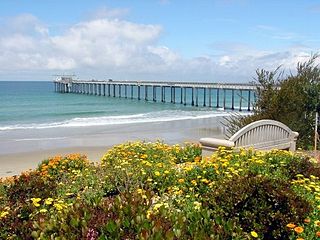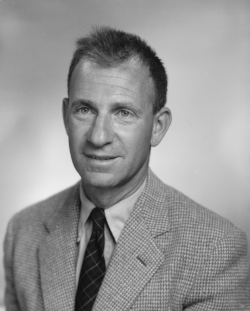The topic of this article may not meet Wikipedia's notability guideline for academics .(July 2020) |
Anais Orsi is a climate scientist studying global warming through changes in polar ice. [1]
The topic of this article may not meet Wikipedia's notability guideline for academics .(July 2020) |
Anais Orsi is a climate scientist studying global warming through changes in polar ice. [1]
Orsi received a Master's Degree in Engineering from the École Polytechnique in 2007. She then obtained a Master's Degree in Oceanography from the University of California, San Diego, and her PhD from the Scripps Institution of Oceanography. She travels[ when? ] to Antarctica to study internal weather patterns and uses them to predict future climate change. [2]

The Scripps Institution of Oceanography (SIO) is the center for oceanography and earth science at the University of California, San Diego. Its main campus is located in La Jolla, with additional facilities in Point Loma.

Ralph John Cicerone was an American atmospheric scientist and administrator. From 1998 to 2005, he was the chancellor of the University of California, Irvine. From 2005 to 2016, he was the president of the National Academy of Sciences (NAS). He was a "renowned authority" on climate change and atmospheric chemistry, and issued an early warning about the grave potential risks of climate change.

Charles David Keeling was an American scientist whose recording of carbon dioxide at the Mauna Loa Observatory confirmed Svante Arrhenius's proposition (1896) of the possibility of anthropogenic contribution to the greenhouse effect and global warming, by documenting the steadily rising carbon dioxide levels. The Keeling Curve measures the progressive buildup of carbon dioxide, a greenhouse gas, in the atmosphere.

Roger Randall Dougan Revelle was a scientist and scholar who was instrumental in the formative years of the University of California, San Diego and was among the early scientists to study anthropogenic global warming, as well as the movement of Earth's tectonic plates. UC San Diego's first college is named Revelle College in his honor.

Walter Heinrich Munk was an American physical oceanographer. He was one of the first scientists to bring statistical methods to the analysis of oceanographic data. Munk worked on a wide range of topics, including surface waves, geophysical implications of variations in the Earth's rotation, tides, internal waves, deep-ocean drilling into the sea floor, acoustical measurements of ocean properties, sea level rise, and climate change. His work won awards including the National Medal of Science, the Kyoto Prize, and induction to the French Legion of Honour.

The L'Oréal-UNESCO For Women in Science International Awards, created in 1998, aim to improve the position of women in science by recognizing outstanding women researchers who have contributed to scientific progress. The awards are a result of a partnership between the Foundation of the French company L'Oréal and the United Nations Educational, Scientific and Cultural Organization (UNESCO) and carry a grant of $100,000 USD for each laureate. This award is also known as the L'Oréal-UNESCO Women in Science Awards.

Naomi Oreskes is an American historian of science. She became Professor of the History of Science and Affiliated Professor of Earth and Planetary Sciences at Harvard University in 2013, after 15 years as Professor of History and Science Studies at the University of California, San Diego.

Marcia Kemper McNutt is an American geophysicist and the 22nd president of the National Academy of Sciences (NAS) of the United States.
Lynne Talley is a physical oceanographer at Scripps Institution of Oceanography known for her research into the large-scale circulation of water masses in the global ocean.

Richard Chapin James Somerville is an American climate scientist who is a Distinguished Professor Emeritus at Scripps Institution of Oceanography at the University of California, San Diego, where he has been a professor since 1979.

Susan M Gaines is an American writer. She is the author of the novels Accidentals (2020) and Carbon Dreams (2001), and co-author with Geoffrey Eglinton and Jurgen Rullkötter of the science book Echoes of Life: What Fossil Molecules Reveal about Earth History (2009). Her short stories have been nominated twice for the Pushcart Prize. She is a former fellow of the Hanse Institute for Advanced Study in Germany. In 2018, she was awarded a Suffrage Science Award for women in science and science writers who have inspired others.
Ralph Franklin Keeling is a professor at Scripps Institution of Oceanography. He is the Principal Investigator for the Atmospheric Oxygen Research Group at Scripps and is the director of the Scripps CO2 Program, the measurement program behind the Keeling curve, which was started by his father Charles David Keeling in 1958. Ralph Keeling has developed precise instruments and techniques for the measurement of atmospheric oxygen and anthropogenic CO2 in the ocean, and for the analysis of land and ocean carbon sinks.
Margaret Leinen is an American paleoceanographer and paleoclimatologist. In 2013, Leinen was appointed the 11th director of the Scripps Institution of Oceanography, as well as the dean of the School of Marine Sciences at the University of California, San Diego. She founded the Climate Response Fund, a non-profit focused on enabling better understanding, regulation and responsible use of climate engineering research, and served as its president for a time. For two years, Leinen also worked as chief science officer for a startup company in green technology and climate change mitigation. Leinen has also served as the U.S. Department of State science envoy for the oceans to Latin America and the Pacific.
Julie Michelle Arblaster is an Australian scientist. She is a Professor in the School of Earth, Atmosphere and Environment at Monash University. She was a contributing author on reports for which the Intergovernmental Panel on Climate Change (IPCC) was a co-recipient of the 2007 Nobel Peace Prize. Arblaster was a lead author on Chapter 12 of the IPCC Working Group I contribution to the IPCC Fifth Assessment Report in 2013. She has received the 2014 Anton Hales Medal for research in earth sciences from the Australian Academy of Science, and the 2017 Priestley Medal from the Australian Meteorological and Oceanographic Society. She has been ranked as one of the Top Influential Earth Scientists of 2010-2020, based on citations and discussion of her work.
Lisa A. Levin is a Distinguished Professor of biological oceanography and marine ecology at the Scripps Institution of Oceanography. She holds the Elizabeth Hamman and Morgan Dene Oliver Chair in Marine Biodiversity and Conservation Science. She studies coastal and deep-sea ecosystems and is a Fellow of the American Association for the Advancement of Science.
Kimberly A. Prather is an American atmospheric chemist. She is a distinguished chair in atmospheric chemistry and a distinguished professor at the Scripps Institution of Oceanography and department of chemistry and biochemistry at UC San Diego. Her work focuses on how humans are influencing the atmosphere and climate. In 2019, she was elected a member of the National Academy of Engineering for technologies that transformed understanding of aerosols and their impacts on air quality, climate, and human health. In 2020, she was elected as a member of the National Academy of Sciences. She is also an elected Fellow of the American Philosophical Society, American Geophysical Union, the American Association for the Advancement of Science, American Philosophical Society, and the American Academy of Arts and Sciences.
Jane Kathryn Willenbring is an American geomorphologist and professor at Stanford University. She is best known for using cosmogenic nuclides to investigate landscape changes and dynamics. She has won multiple awards including the Antarctica Service Medal and the National Science Foundation CAREER Award.

Melania Guerra is a strategy scientist, connecting scientific knowledge and policy making. Guerra's background is in mechanical engineering, research, marine science, and advocating for climate change, ocean conservation and female empowerment.
María del Pilar Jiménez Alzate is a Colombian biological researcher and recipient of a L'Oréal-UNESCO for Women in Science award in the International Rising Talent category for the year 2000 for her research work in the area of mycoses, fungal infections, becoming the first scientific Colombian to obtain this recognition.
Shang-Ping Xie is a climatology and oceanography researcher who holds the Roger Revelle Chair at Scripps Institution of Oceanography. Known best for his research on interaction between the world's oceans and atmosphere and on El Niño–Southern Oscillation, Xie is noted as a Highly Cited Researcher by Clarivate.